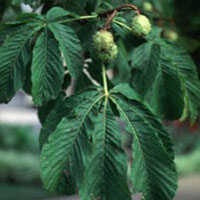health guides
Horse Chestnut
 © Steven Foster
© Steven FosterHow It Works
The seeds are the source of a saponin known as aescin, which has been shown to promote circulation through the veins.2 Aescin fosters normal tone in the walls of the veins, thereby promoting return of blood to the heart. This has made both topical and internal horse chestnut extracts popular in Europe for the treatment of chronic venous insufficiency and, to a lesser extent, varicose veins. Aescin also possesses anti-inflammatory properties and has been shown to reduce edema (swelling with fluid) following trauma, particularly following sports injury, surgery, and head injury.3, 4 A topical aescin preparation is very popular in Europe for the treatment of acute sprains during sporting events. Horse chestnuts also contain flavonoids, sterols, and tannins.
Double-blind and preliminary clinical trials have shown that oral horse chestnut extracts reduce the symptoms of chronic venous insufficiency, including swelling and pain.5, 6 Those suffering oedema after surgery have also found relief from topical application of horse chestnut extracts, according to preliminary studies.7
How to Use It
For treatment of chronic venous insufficiency horse chestnut seed extracts standardised for aescin content (16–20%), 300 mg two to three times per day, are recommended.8, 9 Tincture, 1–4 ml taken three times per day, can be used though it is questionable whether a significant amount of aescin can be absorbed this way.10 Gels or creams containing 2% aescin can be applied topically three or four times per day for haemorrhoids, skin ulcers, varicose veins, sports injuries, and trauma of other kinds.
Copyright © 2024 TraceGains, Inc. All rights reserved.
Learn more about TraceGains, the company.
The information presented by TraceGains is for informational purposes only. It is based on scientific studies (human, animal, or in vitro), clinical experience, or traditional usage as cited in each article. The results reported may not necessarily occur in all individuals. Self-treatment is not recommended for life-threatening conditions that require medical treatment under a doctor's care. For many of the conditions discussed, treatment with prescription or over the counter medication is also available. Consult your doctor, practitioner, and/or pharmacist for any health problem and before using any supplements or before making any changes in prescribed medications. Information expires December 2024.


 We are proud to announce that
We are proud to announce that  As the market evolves, customers increasingly request a wider variety of omega-3 options for their lipid...
As the market evolves, customers increasingly request a wider variety of omega-3 options for their lipid...  Maintaining healthy glucose levels is crucial for preventing metabolic conditions like diabetes,...
Maintaining healthy glucose levels is crucial for preventing metabolic conditions like diabetes,...  Looking at formulating a new vitamin blend? Discover
Looking at formulating a new vitamin blend? Discover 







































